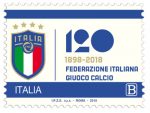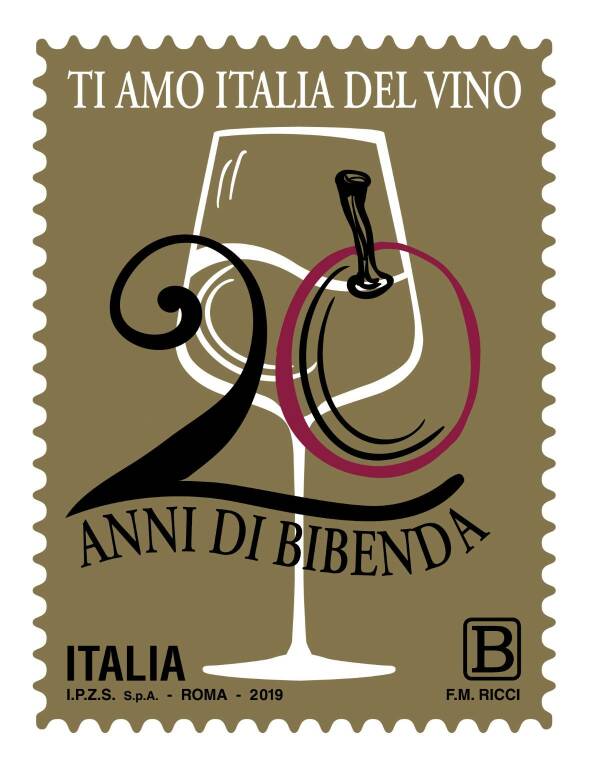POSTE ITALIANE 19^ Emissione del 19 Luglio 2018 -F.I.G.C.
Titolo: 120° Anniversario della Fondazione della F.I.G.C. (Federazione Italiana Giuoco Calcio)
La Federazione Italiana Giuoco Calcio, nota anche con la sigla FIGC e come Federcalcio, è l’organo di organizzazione e controllo del calcio in Italia, occupandosi sia di calcio a 11 sia del calcio a 5 ed è affiliato al CONI. Ha sede a Roma, mentre il Centro Tecnico Sportivo Federale è a Firenze (quartiere di Coverciano). La FIGC coordina i vari campionati di calcio professionistico (dalla Serie A e Coppa Italia fino alla Serie C) e non professionistico (dalla Serie D fino ai campionati a carattere provinciale). Alla FIGC è inoltre affiliata l’Associazione Italiana Arbitri (AIA), la quale designa gli arbitri e gli assistenti arbitrali per le gare organizzate dalla Federazione.
Fondata a Torino il 15 marzo 1898 con il nome di Federazione Italiana del Football (FIF), mantenne tale denominazione fino al 1909.
Ne furono invitate a far parte nella fase costituente le seguenti società:
- Genoa Cricket and Athletic Club
- Football Club Torinese
- Internazionale Torino
- Società Ginnastica Torino
- Unione Pro Sport Alessandria
- SEF Mediolanum
- Società Ginnastica Ligure Cristoforo Colombo
Tuttavia, alcune di queste preferirono rimanere nell’orbita della Federazione Ginnastica d’Italia, federazione che metteva in palio, durante i propri campionati ginnici, anche un titolo per il football.
Nello stesso anno della sua fondazione la Federazione organizzò il primo campionato di calcio italiano: si trattò di un torneo disputatosi a Torino in una sola giornata, che venne vinto dal Genoa.
La Federazione fu riconosciuta dalla FIFA nel 1905 e fa parte dell’UEFA sin dalla nascita della confederazione europea, avvenuta nel 1954.
Nella storia della Federazione, a partire dal Dopoguerra in avanti, è successo che la stessa fosse commissariata a seguito di stravolgimenti legati a risultati deludenti conseguiti sul campo dalla nazionale oppure a scandali extracalcistici.
Il primo caso di commissariamento si verificò nell’estate del 1958 e fu la conseguenza del “disastro di Belfast”, ovvero la mancata qualificazione ai Mondiali in Svezia, la cui responsabilità venne addebitate alle società professionistiche, ritenute colpevoli di aver anteposto le loro esigenze a quelle della Nazionale. Giulio Onesti, presidente del Comitato Olimpico, si espresse in termini durissimi, portando Ottorino Barassi, presidente della Federazione, a dimettersi: il 13 agosto, si giunse al commissariamento della FIGC. Venne nominata la figura di Bruno Zauli.
Nel 1986, le conseguenze del cosiddetto Totonero bis portarono all’avvicendamento tra il presidente federale Federico Sordillo e il commissario Franco Carraro. Nel 1996, invece, le vicissitudini personali del presidente Antonio Matarrese (rinviato a giudizio per abuso d’ufficio in violazione delle norme interne alla Federazione) favorirono l’arrivo del commissario Raffaele Pagnozzi. Nel 2000 fu la volta di Gianni Petrucci, che divenne commissario straordinario dopo la mancata rielezione di Luciano Nizzola.
Nel maggio del 2006, a seguito delle conseguenze del cosiddetto scandalo di Calciopoli, il presidente Carraro fu sostituito da Guido Rossi prima e Luca Pancalli poi.
Nel novembre del 2017, la mancata qualificazione ai Mondiali in Russia spinse il presidente Carlo Tavecchio a rassegnare le dimissioni; l’incapacità di eleggere un nuovo presidente federale tramite elezioni, rese necessaria la nomina di un commissario straordinario da parte del Comitato Olimpico: l’incarico fu affidato a Roberto Fabbricini.
La FIGC dirige e organizza l’attività della Nazionale maschile e delle nazionali giovanili; inoltre supervisiona, controlla e coordina le leghe che organizzano i campionati professionistici (Lega Serie A, Lega B, Lega Pro), e i campionati a carattere dilettantistico di livello interregionale (Lega Nazionale Dilettanti, Divisione Calcio a 5 e calcio femminile). La FIGC promuove inoltre i tornei, le attività e le iniziative riservate ai settori giovanili.
A livello regionale la FIGC agisce attraverso i Comitati Regionali e le Delegazioni Provinciali e Locali.
Title: 120th Anniversary of the Foundation of the F.I.G.C. (Italian Football Association)
The Federazione Italiana Giuoco Calcio, also known by the acronym FIGC and as Federcalcio, is the organ of organization and control of football in Italy, taking care of both 11 and 5-a-side football and is affiliated to CONI. It is based in Rome, while the Federal Sports Technical Center is in Florence (Coverciano district). The FIGC coordinates the various professional football championships (from Serie A and Coppa Italia to Serie C) and non-professional (from Serie D to provincial championships). The Italian Referees Association (AIA) is also affiliated to the FIGC, which appoints the referees and the arbitration assistants for the competitions organized by the Federation.
Founded in Turin on March 15, 1898 under the name of the Italian Football Federation (FIF), it maintained this name until 1909.
The following companies were invited to participate in the constituent phase:
- Genoa Cricket and Athletic Club
- Football Club Torinese
- International Turin
- Turin Gymnastics SocietyUnion Pro Sport Alessandria
- SEF Mediolanum
- Ligurian Gymnastics Society Cristoforo ColomboHowever, Some of these preferred to remain in the orbit of the Federation of Italian Gymnastics, a federation that was giving away, during their gymnastics championships, even a title for football.
In the same year of its foundation the Federation organized the first Italian soccer championship: it was a tournament held in Turin in just one day, which was won by Genoa.
The Federation was recognized by FIFA in 1905 and is part of the UEFA since the birth of the European confederation, which took place in 1954.
In the history of the Federation, starting from the post-war period, it happened that the same was commissariate following upheavals related to disappointing results achieved on the field by the national or extra-curricular scandals.
The first case of commissioner occurred in the summer of 1958 and was the consequence of the “Belfast disaster”, ie the failure to qualify for the World Cup in Sweden, whose responsibility was charged to the professional companies, found guilty of having prepended their needs to those of the National. Giulio Onesti, president of the Olympic Committee, expressed himself in very harsh terms, bringing Ottorino Barassi, president of the Federation, to resign: on August 13, he arrived at the commissariate of the FIGC. The figure of Bruno Zauli was named.
In 1986, the consequences of the so-called Totonero bis led to the alternation between federal president Federico Sordillo and commissioner Franco Carraro. In 1996, however, the personal vicissitudes of President Antonio Matarrese (postponed for trial for abuse of office in violation of the rules within the Federation) favored the arrival of Commissioner Raffaele Pagnozzi. In 2000 it was the turn of Gianni Petrucci, who became an extraordinary commissioner after the failed re-election of Luciano Nizzola.
In May 2006, following the consequences of the so-called Calciopoli scandal, President Carraro was replaced by Guido Rossi first and then Luca Pancalli.
In November 2017, the failure to qualify for the World Cup in Russia prompted President Carlo Tavecchio to resign; the inability to elect a new federal president by elections made it necessary to appoint an extraordinary commissioner from the Olympic Committee: the assignment was entrusted to Roberto Fabbricini.
The FIGC directs and organizes the activities of the national men’s and youth national teams; it also supervises, controls and coordinates the leagues that organize the professional championships (Lega Serie A, Lega B, Lega Pro), and the amateur championships of interregional level (National Amateur League, Division Soccer 5 and women’s football). The FIGC also promotes tournaments, activities and initiatives reserved for youth sectors.
At regional level, the FIGC acts through the Regional Committees and the Provincial and Local Delegations
| data /date | 19.07.2018 |
| n. catalogo / n. catalog | Mi 4056 – YT 3817 – Un.3899 |
| dentellatura/Serration | 11 |
| stampa/printing | fustellatura – rotocalco |
| tipo di carta/paper type | bianca patinata neutra |
| stampato | I.P.Z.S. Roma |
| fogli/sheet | 28 |
| dimensioni/dimensions | 40 x 30 mm |
| disegnatore /designer | |
| tiratura | 600.000 |








When I originally commented I clicked the Notify me when new comments are added checkbox and now every time a comment is added I get 4 emails using the same comment. Is there any way you may take away me from that service? Thanks! gdbbagefdekdgedd
Sorry for the inconvenience you’ve encountered; but unfortunately I do not know where to act in the programming of the site because everything happens automatically. Continue to follow my site. Thank you